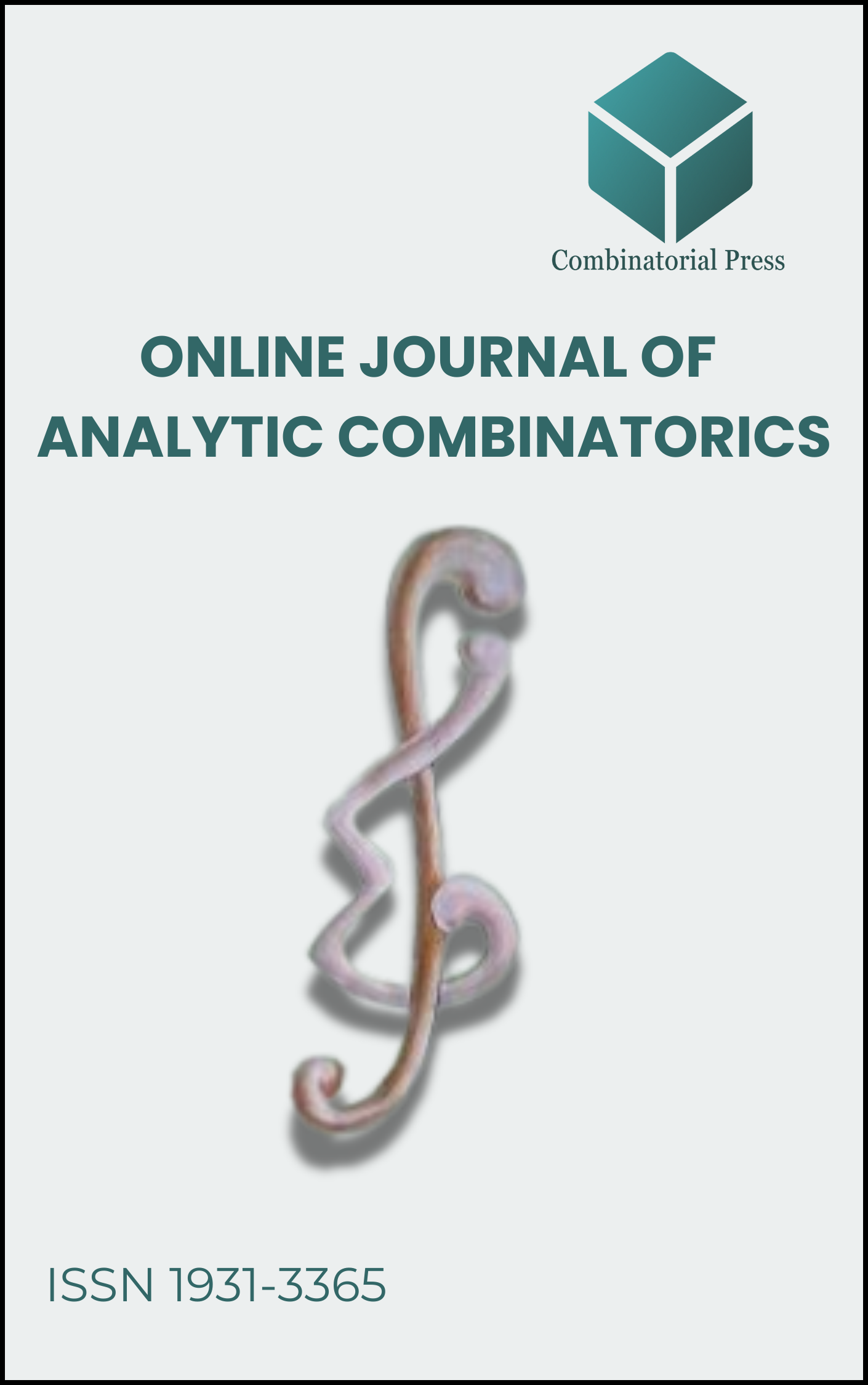
Online Journal of Analytic Combinatorics
ISSN 1931-3365 (online)
The Online Journal of Analytic Combinatorics (OJAC) is a peer-reviewed electronic journal previously hosted by the University of Rochester and now published by Combinatorial Press. OJAC features research articles that span a broad spectrum of topics, including analysis, number theory, and combinatorics, with a focus on the convergence and interplay between these disciplines. The journal particularly welcomes submissions that incorporate one or more of the following elements: combinatorial results derived using analytic methods, analytic results achieved through combinatorial approaches, or a synthesis of combinatorics and analysis in either the methodologies or their applications
Information Menu
- Research article
- https://doi.org/10.61091/ojac-1409
- Full Text
- Online Journal of Analytic Combinatorics
- Issue 14, 2019
- Pages: 1-10 (Paper #9)
- Published: 31/12/2019
For Cauchy numbers of the first kind
- Research article
- https://doi.org/10.61091/ojac-1408
- Full Text
- Online Journal of Analytic Combinatorics
- Issue 14, 2019
- Pages: 1-13 (Paper #8)
- Published: 31/12/2019
Let
- Research article
- https://doi.org/10.61091/ojac-1407
- Full Text
- Online Journal of Analytic Combinatorics
- Issue 14, 2019
- Pages: 1-8 (Paper #7)
- Published: 31/12/2019
Let
- Research article
- https://doi.org/10.61091/ojac-1406
- Full Text
- Online Journal of Analytic Combinatorics
- Issue 14, 2019
- Pages: 1-20 (Paper #6)
- Published: 31/12/2019
In 1998, D. Callan obtained a binomial identity involving the derangement numbers. In this paper, by using the theory of formal series, we extend such an identity to the generalized derangement numbers. Then, by using the same technique, we obtain other identities of the same kind for the generalized arrangement numbers, the generalized Laguerre polynomials, the generalized Hermite polynomials, the generalized exponential polynomials and the generalized Bell numbers, the hyperharmonic numbers, the Lagrange polynomials and the Gegenbauer polynomials.
- Research article
- https://doi.org/10.61091/ojac-1405
- Full Text
- Online Journal of Analytic Combinatorics
- Issue 14, 2019
- Pages: 1-6 (Paper #5)
- Published: 31/12/2019
In this paper, we present a method to construct a cyclic orthogonal double cover (CODC) of circulant graphs by certain kinds of coronas that model by linear functions.
- Research article
- https://doi.org/10.61091/ojac-1404
- Full Text
- Online Journal of Analytic Combinatorics
- Issue 14, 2019
- Pages: 1-22 (Paper #4)
- Published: 31/12/2019
Following the work of Cano and Díaz, we study continuous binomial coefficients and Catalan numbers. We explore their analytic properties, including integral identities and generalizations of discrete convolutions. We also conduct an in-depth analysis of a continuous analogue of the binomial distribution, including a stochastic representation as a Goldstein-Kac process.
- Research article
- https://doi.org/10.61091/ojac-1403
- Full Text
- Online Journal of Analytic Combinatorics
- Issue 14, 2019
- Pages: 1-13 (Paper #3)
- Published: 31/12/2019
In this paper, we introduce a new operator in order to derive some properties of homogeneous symmetric functions. By making use of the proposed operator, we give some new generating functions for
- Research article
- https://doi.org/10.61091/ojac-1402
- Full Text
- Online Journal of Analytic Combinatorics
- Issue 14, 2019
- Pages: 1-13 (Paper #2)
- Published: 31/12/2019
In this paper, we introduce the concept block matrix (B-matrix) of a graph
- Research article
- https://doi.org/10.61091/ojac-1401
- Full Text
- Online Journal of Analytic Combinatorics
- Issue 14, 2019
- Pages: 1-7 (Paper #1)
We consider analogs of several classical diophantine equations, such as Fermat’s last theorem and Catalan’s conjecture, for certain classes of analytic functions. We give simple direct proofs avoiding use of deep theorems in complex analysis. As a byproduct of our results, we obtain new proofs for the corresponding results over polynomials.
- Research article
- https://doi.org/10.61091/ojac-1307
- Full Text
- Online Journal of Analytic Combinatorics
- Issue 13, 2018
- Pages: 1-35 (Paper #7)
- Published: 31/12/2018
Applying the multisection series method to the MacLaurin series expansion of arcsin-function, we transform the Apéry–like series involving the central binomial coefficients into systems of linear equations. By resolving the linear systems (for example, by Mathematica), we establish numerous remarkable infinite series formulae for π and logarithm functions, including several recent results due to Almkvist et al. (2003) and Zheng (2008).





